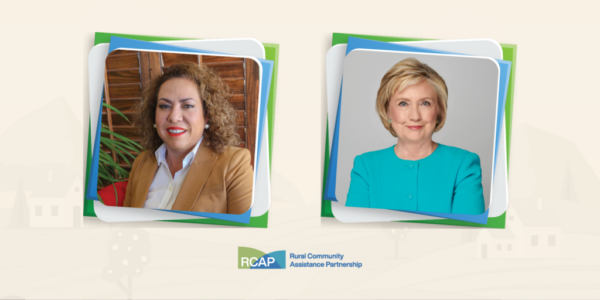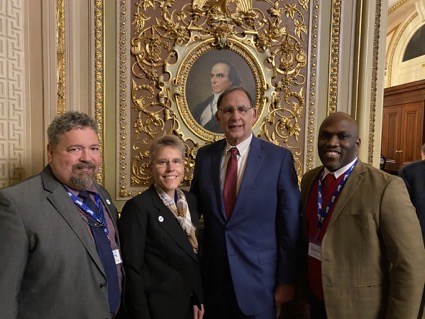
RCAP Joins Hillary Clinton, Columbia University, For A Conversation on Rural and Tribal Infrastructure
Olga Morales-Pate, Rural Community Assistance Partnership Inc. (RCAP) CEO, joined Columbia World Projects and other experts for a discussion on water and wastewater systems in rural areas. The conversation, moderated by former Secretary of State and presidential candidate Hillary Clinton, was fruitful and brought together a network of diverse perspectives and backgrounds to discuss the various challenges and constraints unique to this type of infrastructure.
“As a technical assistance provider organization of fifty years, we work with these kinds of challenges and communities day in and day out… The number of challenges that we have across the country are many. When we put the responsibility on the individual resident, if we know that the cost per household is prohibitive, we are never going to get to a sustainable solution,” Morales-Pate stated.
RCAP is made up of six regional affiliates which have strong local relationships, specialized knowledge for communities, and employees who are in the communities they serve while also having the strength of national breadth. This combination enables effective work which produces change. One thing is clear- every community looks different.
A common theme was that many considered access to wastewater sanitation and other water infrastructure systems a human right, which makes this topic vitally important to address. Education, improved data collection to understand what systems households use, innovation in methods and mindset, sustainability and longevity, and equity in services were all important factors to consider. In addition, servicing clusters of people instead of individuals in a community was thought to yield a larger impact in hard to access communities.
Bringing together expertise to share knowledge, learn, and improve is a part of RCAP’s value system. We were happy to be a part of the conversation on rural development with Columbia World Projects and stand committed to partnering with individual communities as technical assistance providers. It is vital to build trust and reliability at the local level while also keeping in mind what is happening nationwide.

A Look Inside RCAP’s Fly-In: Meeting With the Team Behind the Fly-In
From February 27 to March 2, 2023, the Rural Community Assistance Partnership (RCAP) will host our annual Fly-In in Washington D.C. To get an inside perspective on the Fly-In, I sat down with RCAP’s Policy & Advocacy team, which includes some of the folks on the Fly-In planning team. These individuals include Hunter Jackman, Maranda Saling, and Ted Stiger. This will be both Hunter and Maranda’s first in-person Fly-In.
In your own words, what is the RCAP Fly-In?
Maranda: I’m still trying to get ahold of what the Fly-In is, but I believe this is our opportunity for our regions to come together with our National Office staff in D.C. and get an insider view of the advocacy work that we do. Additionally, regional staff gets to spend time with staff on the Hill to build relationships and they can go back home to continue their work.
Hunter: That’s a good summary but I have a few additions. When regional staff members are building relationships with their Members of Congress (MoC) and their offices, they are also talking about the work they’ve done over the past year or so. It’s a chance to showcase their work and bring their work to serve a higher purpose in the sense that the work speaks directly to some of our (RCAP’s) policy priorities. It’s really powerful for MoC to hear the impact and work that’s directly impacting these communities, showing that these programs and funds are being put to good use.
As a follow-up, for those who are not attending the Fly-In. How can they interact with Congress outside of this event?
M: Due to COVID-19, folks can interact with MoC through virtual meetings. Additionally, folks can visit their state offices and build relationships with those who work in those offices. Additionally, regions will get external materials I believe they can use outside of the Fly-In?
H: Correct! Those external materials can be used all year (such as the RCAP one-pager and our policy priorities) and remain valuable. Any skills regional staff members learn during the Fly-In preparatory webinar or experiences they had while reaching out to their MoC to schedule a meeting can easily transfer over to their interactions with their home offices. I think the value goes beyond just this Fly-In.
Ted: I want to jump in and say the National Office advocacy team provides a ton of resources and training to regional staff. We provide services to regions to be able to support their communities and really advocate not only for their organizations but for the communities as well.
Okay, now this is going to be our first in-person Fly-In since 2020. Hunter, I know you have attended Fly-Ins in the past, albeit virtual, and Maranda, this will be your first Fly-In ever. How do you two feel about the preparation that went into the in-person Fly-In? Any differences between the preparation for the virtual? Excited?
M: I’ll start. I’m very excited to be in person since this is my first actual Fly-In. Our prep work has been thorough and very fun, utilizing the relationships we’ve already built.
H: I’m also very excited for it to be hosted in person this year. A lot of the prep work is the same from my end. The logistics of hosting the event are a bit more complicated in-person than in Zoom. In terms of relationship building, having these briefings in person humanizes this work a bit more. It feels more powerful than hosting it over Zoom because there are human beings you tune in and listen to. We’ll see benefits from hosting our briefings and plenaries in person.
T: This is my 13th year in a row doing Fly-Ins and advocacy days, so I think over the years I’ve picked up some tips of the trade and that we’re really offering cutting-edge Fly-In advocacy for the network. I prefer in-person over virtual any day, but at least Capitol Hill has changed the culture where we can have meetings and not have to go to Washington D.C. Being in person is great for relationship building, but flying to Washington D.C. was always an access issue. Having a virtual option helps widen our impact, but we have to be cognizant of those who live in rural and don’t have the bandwidth strength to reach out to their MoC. We’re excited about both in-person and virtual options and want to make sure everyone is prepared for both options.
Lastly, are there any big things coming up for the Fly-In this year that people should be on the lookout for?
T: We have Radikha Fox who runs the EPA office of water. We have a lineup of speakers who are key decision-makers in Washington. We have Mitch Landrieu, who Biden appointed to oversee the entire Bipartisan Infrastructure Law, which is almost $1t in investments. We also have Senator Boozman coming to accept his congressional award and we are giving an award to Senator Brown as well. We support MoCs who are interested in getting things done and are problem-solvers.
H: Something I’m particularly excited about this Fly-In is that this is the first time we’ll be having Community Economic Development (CED) programming at a Fly-In. Right, Ted?
T: Yes, this will be the first congressional briefing that we’ve done on community economic development policy at a Fly-In.
H: One point of clarification is this will be the first time we’ve had a CED briefing at a Fly-In, but we had a briefing back in June of 2022, that was separate from the Fly-In. These briefings occur to further RCAP’s CED policy work in Washington D.C. and beyond. We want to continue furthering our advocacy efforts around community and economic development issues when possible.
Anything else? Maranda?
M: I’m pretty excited about presenting the Congressional Awards and meeting one of the Senators!
Yeah, those are pretty fun. That covers all the questions for today. I appreciate you all taking the time to chat with me about this year’s Fly-In.
Learn more about the Fly-In here and follow along on Twitter with the hashtag #RCAPOnTheHill2023

A Look Inside RCAP’s Fly-In: Sharing the Stories and Needs of Rural Communities with Congress
From February 28 to March 3, 2022, the Rural Community Assistance Partnership (RCAP) will host our annual Fly-In in Washington D.C. This event brings representatives from our six regional partners from across the country to meet with government agencies and to generate awareness for rural issues on Capitol Hill. Representatives meet with their members of Congress and reinforce the importance and value of federal programs for rural economic development and water and wastewater infrastructure.
To get an inside perspective on the Fly-In, I sat down with Brad Jarrett, the Arkansas State Coordinator for our southern partner, Communities Unlimited (CU). Jarrett has worked with CU for 12 years and has attended the Fly-In since 2020.
Tell me a little about your work with CU.
I work mostly on the environmental team. We do technical assistance for small, rural, underserved communities regarding community facilities for water and wastewater. Over the years, I have seen a need for this kind of technical assistance in small communities. We do a lot of good when we can connect their resources with our expertise and training. We bring a lot of good to the communities to empower them and help their water and wastewater operations function effectively.
How many Fly-Ins have you attended?
I’ve participated in two Fly-Ins so far, and I’m looking forward to my third this year! In 2019, I was promoted to the role of State Coordinator in Arkansas, and immediately began to look to attending the Fly-In. In 2020, I participated in person on Capitol Hill. In 2021, it was a virtual event, like this year.
For those unfamiliar, tell me about the Fly-In.
In person, it is very busy. You’re going up and down the Hill, talking with senators and representatives, or sitting in on meetings with others. I usually meet with members of Congress from Arkansas. It’s also a great opportunity to talk with your fellow technical assistance providers (TAP) to share experiences and knowledge. It is tiring and busy, but fun and rewarding because we are able to promote the work we are doing on the ground. Members of Congress always want to know what is going on in their areas, so we talk about the projects we have in the communities they serve.
As a TAP, what is the Fly-In like?
The best part of the Fly-In is really connecting. When you are at the Fly-In, it is a learning experience to be able to see firsthand what is on the mind of members of Congress. We want them to understand what we see on the ground. We want them to see exactly how funding impacts these underserved communities. It means a lot to me to be able to communicate with them. Not only are we providing technical assistance in the communities, but we are also communicating its impact to congressional leaders. We get to say, “This is where the need is, we see it.”
Sometimes, a member of Congress or their staff might have grown up in the communities we are talking about. I’ve met with staff from Senator Boozman’s office who are from the communities CU works in. In one meeting, I bonded with a staffer over a common local restaurant, Joe’s Diner. Joe’s Diner has these little crab claws that everyone loves. So we were able to talk and connect around a shared experience.
Have you had any stand-out experiences?
In 2020, Senator Boozman was coming off the Senate floor and couldn’t make our meeting. But he didn’t want us to leave without talking to him. He wanted to hear about our work in Arkansas. So, his staff took our team underground through the Senate, and we met him coming off the floor.
What do you think the impact of the Fly-In is for your local communities?
It is huge. The communities need a voice, and we are the voice. The communities know what technical assistance is needed, but they may need us to articulate it and share their stories. It is vital to share the importance of technical assistance. Before a community joins with CU, they may be struggling to meet compliance, get new infrastructure, or save money. When we help to provide these resources, like technical assistance and training, it helps them so much. When we complete a project, communities are always looking for more ways we can help them.
At the Fly-In, I’m there to listen to the congressional staff, but I’m there to tell the communities’ stories. I’m there to say, “We need this.” In 2021, with the virtual Fly-In, we had a local mayor, Mayor Tonya Kendrix of Hermitage, AR, get on the call. She was able to tell Senator Boozman about the assistance her community has received.
Do you have any advice for someone attending the Fly-In for the first time?
Be mindful of the process and context, especially virtually. It is your opportunity to ask questions and learn. Try to understand the big picture. I’d recommend attending the general sessions where everyone is speaking. I always want to attend those because it is a learning experience. I love to fish, I don’t care how many times I have gone fishing, I always learn something new. New things come up all the time in the field we work in, and we want to be ready for them. My advice is to take it all in, be as flexible as you can, and don’t be afraid to help out. It is a challenge but it is a learning experience.
Anything else?
To all the new people joining RCAP or experiencing the first Fly-In, every region in RCAP will support you. We work in a great network and everyone from the other regions is there to help. We are all working towards the same goals!
Learn more about the Fly-In here and follow along on Twitter with the hashtag #RCAPOnTheHill2022
Watch this video about CU’s work with Mayor Tonya Kendrix in Hermitage, AR https://vimeo.com/675469099